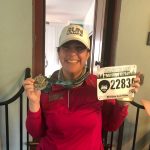BY JOE MULDOWNEY
Amby Burfoot, 70, former editor of Runner’s World magazine and the 1968 winner of the Boston Marathon, once said: “It’s very hard adjusting to the fact that the stopwatch and the calendar don’t lie. You can’t win the race against time, so you have to win it emotionally and be okay with it. Anyone can be fast and healthy in his or her 20s. The real challenge is to be slow and healthy in your 60s and 70s.’’
Last week I was fortunate to have survived another trip around the sun. As each birthday passes by, I am reminded of another mantra, from singer/songwriter Jimmy Buffett, which proclaims, “I’m growing older, but not up.”
Aging athletes, in any sport, often have difficulty reinventing themselves. High-profile professional athletes can transition to the broadcasting booth, but runners, and participants in sports that do not pay the bills, have limited aging options if they hope to maintain relevance in their respective sports.
Coaching is an excellent method of remaining involved in one’s sport. There are few things more gratifying than molding young athletes by passing along the wisdom and experience gained through many years of participation.
In a sport like running, that gratification lasts long after the athlete competes on the team. Many of the collegiate runners I have had the opportunity to coach have gone on to participate in road races, and some have even run marathons.
But as birthdays begin to accumulate, all runners eventually need to face the realization that, not only can they forget about racing at the same level as they did in their 20s and 30s, but also that by trying to do so they run the risk of serious injury.
In 2013, only three weeks after completing the Boston Marathon, I set out on a routine training run. While chatting with my training partner, I tripped on the sidewalk and fell to the ground, experiencing white-hot pain. The result of my accident was a torn hamstring in two places.
Refusing to accept that I was no longer youthful and invincible, I rehabbed for a short time and resumed a high level of training. A meniscus tear in the knee cascaded into a quick onset of arthritis, and by 2019 I became the proud owner of a plastic and titanium prosthetic knee.
I finally learned what many wiser, aging runners before me have discovered. In order to be able to continue in the sport I love, I need to adjust and adapt.
These days, I run 3-4 days a week and my pace is terribly slow. My races are against myself and my watch. I take in more of the scenery, wave to neighbors and I don’t get jittery if I feel I might miss a day of running.
My orthopedic surgeon counseled me to channel my need to exercise into alternative endeavors. So, I now actually enjoy a brisk walk, a long ride on the bike or paddling a kayak on a river, lake or inlet.
So, another birthday has come and gone. And, although I know I’ll never win the race against time, I’m going to continue to give it a run for its money.
Muldowney is an avid runner and retired educator/coach.




